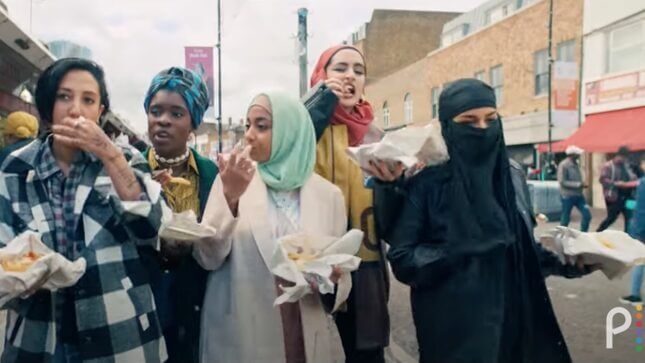follows Amina, a Ph.D. student with a Bridget Jones-esque internal monologue and desire to get married, as she crosses paths with an up-and-coming all-girl Muslim punk band called Lady Parts. The band, headed by the ever-angry Saira, is looking for their big break when a turn of fortune brings Amina into the butcher shop where they’re holding auditions. The connection between Amina, a traditional Muslim woman, and her traditional-with-some-seasoning bandmates, isn’t instant. But through the power of sex, prayer rugs, and rock ‘n’ roll the band comes together just in time to be torn asunder.
Part of my apprehension with watching Lady Parts at all stems mostly from the last comedy about Muslim people, Ramy. For all its critical acclaim, Ramy fumbles the ball consistently when it comes to the core of what both shows are about—relationships. In Ramy, the titular character’s religion is made to feel like a hindrance not only to the kinds of relationships he can have but how he functions within them. The character is so obsessed with being the stereotypical good Muslim that many of the jokes are lost in the seriousness of his existential religious crisis.
This same battle between being the “good” example of one’s religion while also managing a relationship is present in Lady Parts, but it isn’t sucking up all the air in the room. The show’s main characters—Saira, Amina, Momtaz, Bisma, and Ayesha—are living out their faiths in different ways, and because they share the same beliefs they don’t feel the need to constantly explain their decisions to each other or to the audience. The best example of this lies in Momtaz, who manages the bands and also wears a niqab. In any other show or film featuring a covered woman (Quantico, Degrassi, Sex and the City 2) there is almost always a scene where the covered woman has to explain or defend why she’s covered. Momtaz and the rest of the group are never forced to do this, outside of a very funny scene in which Momtaz attempts to play upon the assumption that she is oppressed to try and get the band a gig.
The show is also, to put it as simply as possible, hysterical. Where Ramy sought to tackle serious topics with an understated humor that bordered on unnecessarily brooding, Lady Parts wants you to laugh. Laugh at the stereotypes, laugh at what it means to be a walking talking representation of over a billion people, and above all laugh at the idea that most countries are so far behind in thought that their citizens still cannot see Muslim women as full complex human beings and not sentient bolts of fabric. Much of the laughs for this show come from the band’s incredibly catchy songs like, “Voldemort Under My Headscarf” or “Bashir With the Good Beard,” which subvert the most obvious Muslim tropes, halal marriage and headscarves.
We Are Lady Parts also does an incredible job in building out the ancillary characters, like Amina’s best friend Noor who feels like a hyperbolized version of popular mid-aughts Muslim beau-tubers like Dina Tokyo or Amena Khan. This nod to Muslim pop culture is both welcome and perfectly executed. As the “halal friend” character, Noor is written so well as to be relatable even in moments where she’s at her most frustrating. Certainly, any Muslim woman who spent time at their local halaqa has come across a Noor at some point in their life, which only functions to bring the audience in deeper into this world. Even non-Muslim women of varying religious beliefs can see a part of themselves or their friends in Noor’s crew or Amina and Saira’s very distinct families.
While some of the jokes do write themselves, like ones about music and KFC being halal or not, the show’s creator and writer Nida Manzoor goes above and beyond in infusing humor into every minute of the show—and not just Muslim humor but that impeccably sharp dry wit that British series are known for. We Are Lady Parts is an absolute delight with my only complaint against it being that there’s just a single short season available on streaming. But this is almost made up for by the fact that Lady Parts’ music is available in iTunes for whenever you want to headbang to “Aint’ No One Gonna Honour Kill My Sister But Me.”

